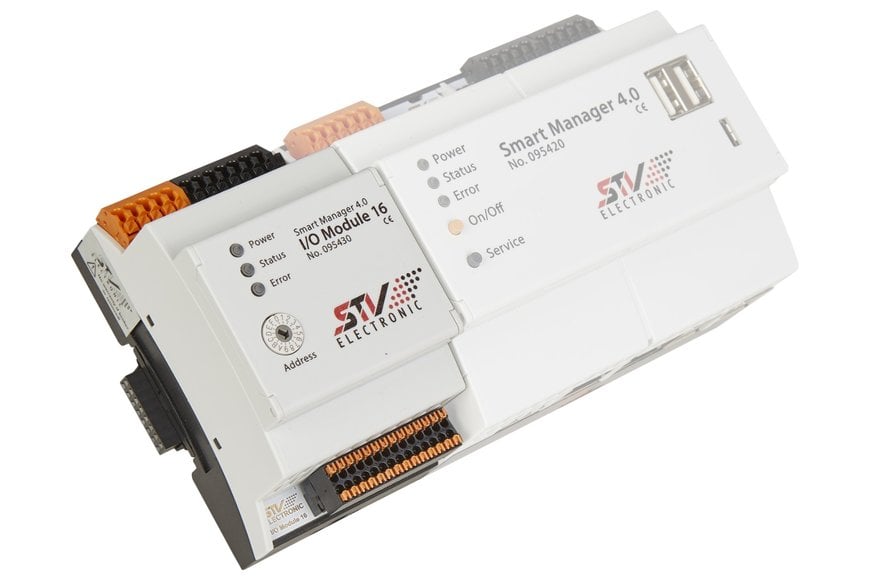electronics-journal.com
20
'20
Written on Modified on
STV Electronic presents flexible I/O expansion module for Raspberry Pi based DIN rail PC
16 to 128 digital I/Os for the Raspberry Pi.

STV Electronic launches a smart digital I/O expansion module for its Raspberry Pi 3 B+ based DIN rail PC. The new I/O Module 16, which can be operated remotely from the system via RS-485, provides 4 digital inputs, 4 digital outputs, and 8 flexible interfaces, configurable either as digital input or digital output. The Smart Manager 4.0 can control up to 8 of these expansion modules via RS-485, making it possible to provide a total of 16 to 128 flexibly configurable digital I/Os. The I/Os are galvanically isolated according to IEC 61131‑2 and support up to a maximum of 2,500 Vrms according to DIN VDE V 0884-11:2017‑01.
The digital I/Os, which can be controlled conform to IEC 61131-3 using free CoDeSys libraries, are ideal for numerous digitalization and edge computing applications in mechanical and plant engineering, as well as industrial and building automation solutions in small flush-mounted distribution boxes with maximum installation depths of up to 70 mm according to DIN 43880.
The STV Electronic I/0 modules use the API (Application Programming Interface) of the Raspberry Pi 3 based Smart Manager for configuration and evaluation. The Smart Manager 4.0 also provides a web interface for configuring and viewing the status of the modules remotely. If using only the inputs of the I/O module, no separate 24VDC power supply is required. In this case, the module is powered directly via the Raspberry Pi DIN rail PC interface. If several I/O modules are connected via RS‑485, each module is given its own address via the coding switch on the front. This allows flexible system expansions with up to 8 I/O modules for up to 128 configurable digital I/Os. If only one module is required for expansion, the I/O Module 16 can be connected wirelessly to the Smart Manager 4.0. Further modules are connected via RS-485 daisy chaining.
“Just like with the Raspberry Pi DIN rail PC, we offer OEMs and system integrators a robust industrial design and long-term availability of at least 10 years for the new I/O modules, too. This includes full Linux OS customization, comprehensive software and integration support, as well as continuously updated security patches. This makes our industrial open source solution extremely attractive for many edge computing tasks in building automation and industrial control technology, especially since we support all common interfaces and will also continuously add new expansion modules to our range,” explains Markus Hühn, Managing Director of STV Electronic.
In the currently available multi-threaded quad-core design, the Raspberry Pi based DIN rail PC Smart Manager 4.0 features a 1.2 GHz Broadcom® BCM2837B0 processor. Next to the new I/O expansion option, up to 2x Ethernet, 6x USB 2.0 and 2 galvanically isolated deterministic serial RS‑485 interfaces are provided as standard. To connect the new I/O Module 16, only one of the two interfaces is needed, while the other can also be designed for RS‑232.
The DIN rail PC further offers an expansion bus, which can be used to connect customer-specific extensions such as WLAN, field buses such as M-Bus, Modbus or LonWorks, as well as other external I/Os. For on-site visualization functions, 1x HDMI is also supported. With an input voltage of 12-30 V, a real-time clock with a minimum 24‑hour battery buffer, and an environmental temperature tolerance from -40°C to +55°C, the embedded Linux based DIN rail PC can be integrated into a wide range of industrial applications.
The new I/O Module 16 for the Raspberry Pi based DIN rail PC Smart Manager 4.0 from STV Electronic is available immediately. Custom-labelled housings, embedded variants, and individual I/O configurations are available on request as well. STV Electronic also helps OEM customers, system integrators and large end users with the design of specific control logic if required. Users can choose between real-time programming environments like CoDeSys, IoT development tools like NodeRed, web server technologies like Node.js or ‘classic’ C and C++ code, as well as many other solutions from the huge Raspberry Pi community. Solutions for building and home automation like FHEM or openHAB, as well as Mosquitto for MQTT based real-time communication, are also supported.
www.stv-electronic.de

